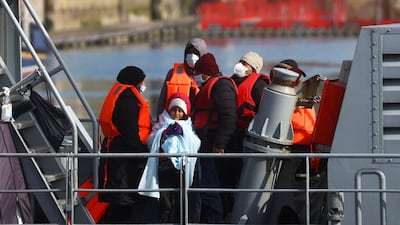Britain’s plan to deport English Channel migrants to Rwanda could be a breach of the Geneva Conventions, said a former child refugee who says he will oppose the plans in the House of Lords.
Alf Dubs, 89, a campaigner for refugees who escaped Nazi-occupied Czechoslovakia as part of the Kindertransport rescue effort in 1939, said he and colleagues in the upper house of the British Parliament would oppose the “awful, shocking” plans.
Ministers believe the proposal to fly asylum seekers to Rwanda will discourage them from attempting perilous Channel crossings, while offering them sanctuary in the African country if their need for protection is genuine.
But opposition politicians and human rights groups said the policy announced by Home Secretary Priti Patel this week is cruel and discriminatory.
“I think it’s a way of getting rid of people the government doesn’t want, dumping them in a distant African country, and they’ll have no chance of getting out of there again,” Mr Dubs told the Guardian.
The House of Lords cannot force the government to drop its plans but it can delay legislation, propose amendments and put pressure on ministers to reconsider.
“I think there will be quite a battle about this,” said Mr Dubs, a peer from the opposition Labour Party, who said Britain was ignoring its obligations under the 1951 refugee convention.

International law assigns responsibility for providing protection to the country where someone seeks asylum, says the UN’s refugee agency UNHCR, which issued a statement objecting to the plans.
It says Britain’s argument that refugees crossing the Channel from France should have claimed asylum in another safe country on their way to northern Europe does not have any support under the convention.
It came as reports in several media outlets suggested dissent from within Ms Patel’s department about the plans.
The reports, not confirmed or denied by the Home Office, said a procedure was invoked in which Ms Patel overruled advice from senior civil servants that the policy was poor value for money.
This is known as a ministerial direction and means officials receive a written order to implement the policy despite their misgivings.
Claire Pearsall, a former Home Office special adviser, said Ms Patel would relish being able to say she had faced down opposition.
“From a political point of view, if you’re being a bit cynical, any opposition to it is actually a vote-winner for core Tory voters,” she told LBC radio.
The plans drawn up with the Rwandan government would involve people being relocated there and granted asylum there, backed by British funding, if their applications succeed.
Prime Minister Boris Johnson said the policy would break the business model of gangs who arrange for people to cross the Channel in unseaworthy boats, a trade which led to the deaths of 27 people in one incident at sea last year.
The Conservative government regards the policy as meeting a public desire to control Britain’s borders, a driving force behind the campaign to take the UK out of the European Union.
Ministers said they expect a legal challenge from critics described by Mr Johnson as a “formidable army of politically motivated lawyers”.
The prime minister said the government was prepared to look at “all and any further legal reforms” which might be necessary to cover their backs.


